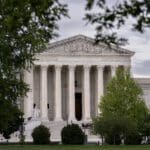Texas attorney general agrees to stop blocking Twitter users following lawsuit
Texas Attorney General Ken Paxton is running for reelection as ‘conservative, stalwart leader with a deep passion and respect for our U.S. Constitution.’

In response to a lawsuit filed against him, Texas Attorney General Ken Paxton has agreed to stop violating the First Amendment rights of his critics. This comes after the embattled Republican has repeatedly presented himself as a strong defender of constitutional rights and free speech.
In a joint stipulation filed in the U.S. District Court for the Western District of Texas on Friday, Paxton said he would no longer block any Twitter users from seeing his personal @KenPaxtonTX account “based on First Amendment-protected viewpoints expressed.” This promise was part of an agreement to end a lawsuit filed against him in April by the ACLU of Texas and the Knight First Amendment Institute at Columbia University on behalf of people Paxton had blocked from his feed after they criticized him.
According to a Knight First Amendment Institute press release on Monday, Paxton frequently uses the Twitter account for postings related to his official duties as Texas attorney general. He had blocked plaintiffs for negative comments about his record.
Kate Huddleston, an attorney for the Texas chapter of the ACLU, said in response to the filing, “This is an important victory for Texans’ First Amendment rights. It shouldn’t have taken a lawsuit for Attorney General Paxton to comply with the Constitution and respect Texans’ right to their free speech, including their right to criticize his policies and qualifications in their responses to his tweets.”
Paxton has long sought to portray himself as a constitutionalist and a First Amendment defender.
His campaign website lists “Preserving the Constitution” as a top issue and calls him a “conservative, stalwart leader with a deep passion and respect for our U.S. Constitution.”
“‘We the People’ established the Constitution of the United States to prohibit the government from seizing our liberties and our God-given rights,” the site states. “As Attorney General, not only do I pledge to defend the Constitution which I am sworn to protect, but I also promise to have the courage to advance the principles it stands for.”
On his official office page, he also has an array of news releases about his work defending what he calls the First Amendment rights of churches, businesses that discriminate against LGBTQ people, and gun owners.
A Paxton spokesperson did not immediately respond to an inquiry for this story.
Though his official website calls him Texas’ “top law enforcement officer,” Paxton is facing a number of legal problems of his own.
In June, the State Bar of Texas launched an investigation into whether his unsuccessful efforts to overturn the results of the 2020 presidential election constituted professional misconduct.
Last November, the FBI reportedly began its own investigation into a whistleblower’s claims that Paxton engaged in “improper influence, abuse of office, bribery and other potential criminal offenses,” including alleged special favors for a top donor and real estate developer. Paxton denied wrongdoing, saying in a statement that these were “false allegations” by “rogue employees.”
In July 2015, Paxton was indicted by a Texas grand jury on criminal charges of securities fraud. He claimed to be innocent of those charges too; six years later his case has not yet come to trial.
Despite the allegations against him, he is currently mounting a 2022 reelection campaign.
Katie Fallow, senior council with the Knight First Amendment Institute, noted in Monday’s press release, “Multiple courts have recognized that government officials who use their social media accounts for official purposes violate the First Amendment if they block people from those accounts on the basis of viewpoint.”
Another federal court ruled differently in a similar case last month, however. U.S. District Court Judge Daniel Domenico, who was appointed by Donald Trump, held that Rep. Lauren Boebert (R-CO) may block former state Rep. Bri Buentello, a constituent who called her a “seditionist,” from viewing her personal Twitter feed. Buentello had sued Boebert on the grounds that Boebert shares official policy on her personal account and therefore cannot block the public from viewing it.
Domenico ruled that Boebert’s use of her personal account does not constitute “state action” and that she is therefore able to use it as she wishes. He wrote:
If the defendant’s position in government makes no difference to her ability to take the action in question, it is hard to see how the action could be deemed to be one taken under authority created by the state or on its behalf. It is not a state-created right or privilege and therefore cannot constitute state action. … Under the unrebutted facts before the Court, Ms. Buentello cannot demonstrate that Representative Boebert’s use of the @laurenboebert account constituted state action. Ms. Buentello therefore has failed to meet her burden of establishing a substantial likelihood of success on the merits of her First Amendment claim.
Published with permission of The American Independent Foundation.
Recommended

Rosenblum, other Democratic AGs ask SCOTUS to block red state bans on emergency abortions
Oregon Attorney General Ellen Rosenblum and nearly two dozen other Democratic-led states urged the U.S. Supreme Court to preserve the ability of emergency room doctors to provide abortions, arguing that failing to do so would have devastating effects for their health care systems and women across the country.
By Gloria Rebecca Gomez, Arizona Mirror - April 01, 2024
Ken Paxton paid $2.3 million to defense lawyers for impeachment trial
The lawyers were paid from his campaign, according to a report filed this week.
By Patrick Svitek, The Texas Tribune - January 18, 2024
Texas governor and attorney general do little to curb state’s chemical plant crisis
Republicans Greg Abbott and Ken Paxton have taken thousands of dollars in donations from chemical companies and their affiliated PACs.
By Jesse Valentine - December 08, 2023









































































